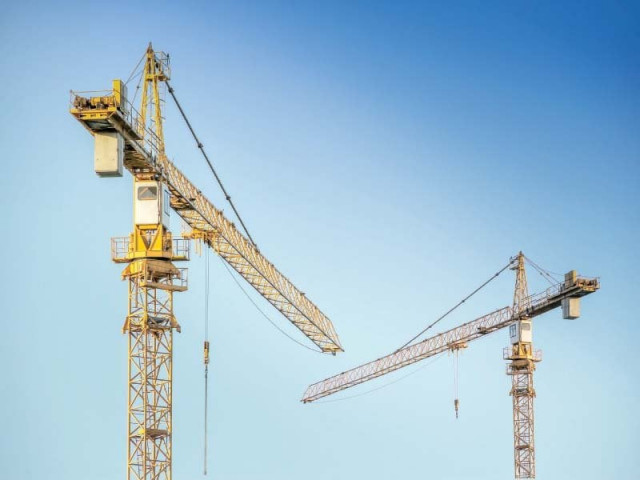PTI govt revises up Tarbela project cost to Rs122.9b
ECNEC approves six projects costing Rs216.4b, including four schemes being executed

The PSDP is riddled with schemes that are facing years of delay. The factors contributing to the delay remain unaddressed, including a lack of fiscal resources. PHOTO: FILE
Headed by Adviser to Prime Minister on Finance Dr Abdul Hafeez Shaikh, the Executive Committee of the National Economic Council (Ecnec) approved the schemes put forth by the Ministry of Planning, Development and Special Initiatives. Planning Minister Asad Umar also attended his first Ecnec meeting.
Ecnec approved an increase in the cost of Tarbela 4th Extension hydroelectric power project to Rs122.9 billion, up Rs40.5 billion or nearly 50% within four years of the project’s execution.
The Public Sector Development Programme (PSDP) is riddled with schemes that are facing years of delay. The factors contributing to the delay remain unaddressed, including a lack of fiscal resources.
Like its predecessor, the Pakistan Tehreek-e-Insaf (PTI) government is approving new projects in meetings of the Central Development Working Party (CDWP) too frequently, which has significantly increased the number of total outstanding approved projects.
The Tarbela 4th Extension project is aimed at increasing the project’s power generation capacity from 3,478 megawatts to 4,888MW by installing three units of 470MW each on the existing irrigation tunnel four. The World Bank is providing financing for the project. Ecnec also approved the Southern Punjab Poverty Alleviation project at a cost of Rs15.52 billion, which had been revised upwards three times.
The government of Punjab and the International Fund for Agricultural Development are financiers of the project and the aim of the project is to contribute to poverty reduction in the southern Punjab region by improving living standards of people, boosting agricultural production and providing infrastructure such as water supply, irrigation, access roads, sanitation and drainage facilities to the population.
The project is expected to be completed by 2023. Ecnec was briefed that the main cause of the cost revision was the change in the exchange rate.
Ecnec also gave approval to the project of Higher Education Development in Pakistan (HEDP), Islamabad at a total cost of Rs12.1 billion, including foreign loan of Rs7.72 billion to be provided by the World Bank.
The project has five components - nurturing academic excellence in strategic sectors, supporting decentralised higher education institutes for improved teaching and learning, equipping students and higher education institutions with modern technology, higher education management information system and data-driven services and technical assistance.
The project is expected to raise the overall quality of higher education in the country with the use of IT services.
The Pakistan Multi-Mission Communication Satellite System (PakSat-MMI) project for the establishment of a geostationary communication satellite and its ground control stations inside Pakistan was approved by Ecnec at a total cost of Rs39.7 billion.
About 15% of the project cost will be financed through the federal PSDP and 85% will be a Chinese concessionary loan.
The project is aimed at helping increase mobile density, tele-density, broadband internet density, employment generation and quick-to-establish means of communication over a large geographical area stretching beyond national borders. The project will be completed in 44 months.
Ecnec approved the Renewable Energy Development Sector Investment Programme (REDSIP) at a three-time upward revised cost of Rs12.8 billion, including foreign loan of Rs8.84 billion.
The project is sponsored by the government of Punjab with financial assistance from the Asian Development Bank (ADB).
The main objective of REDSIP is the construction of hydel projects ie Marala (7.64MW), Chianwali (5.38MW), Deg-Outfall (4.04MW) and Pakpattan (2.82MW) at canal falls of Punjab. The project also envisaged capacity building of the energy department, Punjab.
Ecnec approved a scheme at a cost of Rs13.4 billion to transmit power from projects at Jhimpir and Gharo wind clusters. The cost of this project was revised too.
Ecnec endorsed the report of a committee for the determination of tariff for PC-I-based public-sector power projects.
It was decided that in future all power projects, irrespective of fuel technology, and funded through the PSDP, should comply with the National Electric Power Regulatory Authority’s (Nepra) tariff regime by applying to Nepra for tariff determination at feasibility, EPC and COD stages, including the Balakot hydroelectric power project.
Published in The Express Tribune, January 7th, 2020.
Like Business on Facebook, follow @TribuneBiz on Twitter to stay informed and join in the conversation.



















COMMENTS
Comments are moderated and generally will be posted if they are on-topic and not abusive.
For more information, please see our Comments FAQ